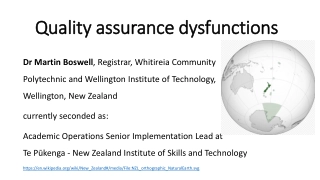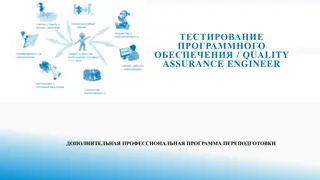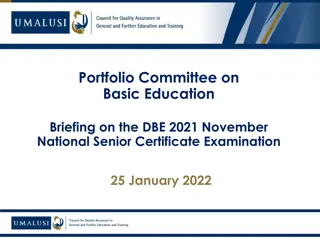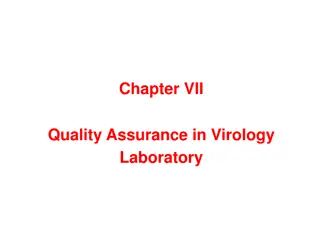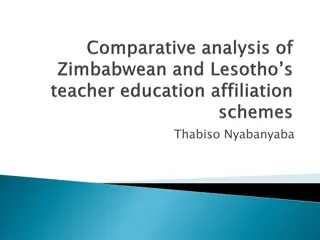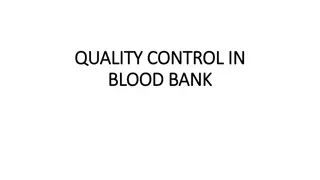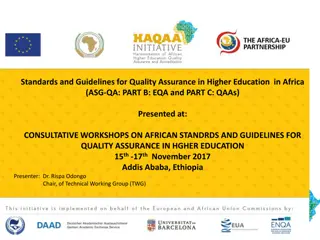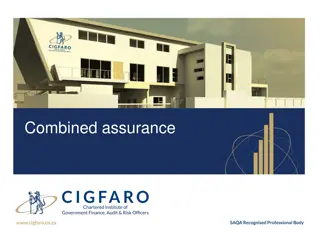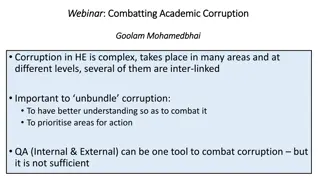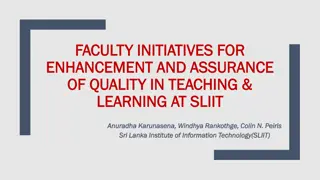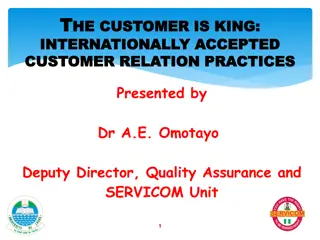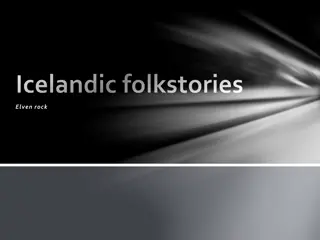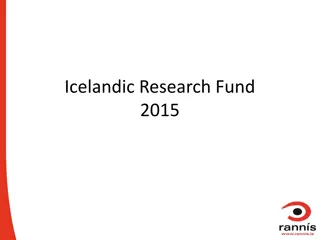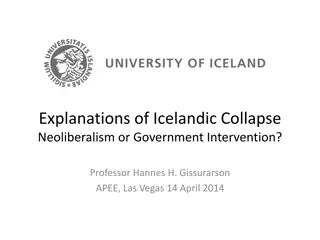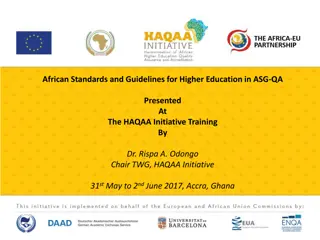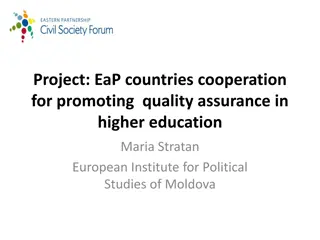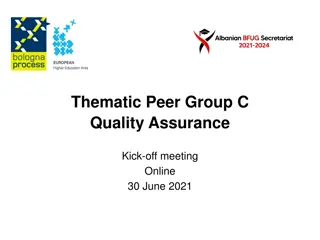Quality Assurance in Icelandic Higher Education Institutions Overview
Presentation and workshop showcasing the quality assurance framework in Icelandic higher education institutions, key figures, student population trends, comparison of HEIs in Iceland, and the Quality Enhancement Framework emphasizing internal quality management systems. The event was conducted by Dr. Sigurður Líður Sigurðsson in collaboration with the National Student Union of Iceland.
Download Presentation

Please find below an Image/Link to download the presentation.
The content on the website is provided AS IS for your information and personal use only. It may not be sold, licensed, or shared on other websites without obtaining consent from the author. Download presentation by click this link. If you encounter any issues during the download, it is possible that the publisher has removed the file from their server.
E N D
Presentation Transcript
Quality Assurance in Icelandic Higher Education Institutions Presentation and workshop with the Board of the National Student Union of Iceland 27. August 2015, from 18.00-22.00 Sigur ur li Sigur sson, Ph.D. Senior Advisor to The QualityBoard for Higher Education in Iceland & BORE Staff
Overview Introduction to Icelandic Higher Education Institutions (HEIs) Icelandic Quality Enhancement Framework Institution-Wide Reviews Subject-Level Reviews Future plans for quality management in Iceland
Key figures Inhabitants Pre-school pupils Comp. school pupils Sec. school students HEI students 325.671 19.615 42.320 25.460 18.619 3
Student population: HEIs 22000 20000 18000 16000 Alls: 14000 12000 10000 8000 1997 1998 1999 2000 2001 2002 2003 2004 2005 2006 2007 2008 2009 2010 2011
HEIs in Iceland Public universities: University of Iceland (UI) est. 1911 University of Akureyri (UNAK) est. 1987 The Agricultural University of Iceland (AUI) est. 1990 s Holar University College (HUC) est. 2006 (or 1106) Private universities (Government dependent) : Reykjavik University (RU) est. 1998 Bifr st University (BU) est. 1990 s Iceland Academy of the Arts (IAA) est. 1990 s
HEIs in Iceland (comparison) UI UNAK HUC AUI BU IAA RU x x x x x x x Master s level PhD level x x x Tuition x x x Distance learning x x x x x x Life-long learning x x x x x x Pre-University Programme x x Number of students 13.619 1.483 213 379 554 379 2.834
Number of students (univ. level) 2,478 232 UI UNAK HUC AUI UB IAA RU 468 232 143 1,483 13,600
To figure out What the HEIs do with (all of) this money, We have the ...
Quality Enhancement Framework By Icelandic law, HEIs should have internal quality management systems Quality Enhancement Framework (QEF1) Quality Board of foreign experts Quality Council of Icelandic stakeholders
The Quality Board Creates framework for quality assurance QEF2 currently in draft stage Makes confidence judgments on quality management in individual HEIs Members of QB are chairs and members of review committees of individual HEIs Schedule annual quality review meetings with QB representatives and individual HEIs
Quality Council Advisory Board to Quality Board Membership of the Council: Rectors of the higher education institutions (or their representatives) Higher education students A representative of the Science Committee of the Science and Technology Policy Committee Also invited: Representative of Ministry of Science, Education and Culture (observer)
Secretariat for the Quality Board The Secretariat for both the Board and the Council is provided by RANNIS, which is independent of the Government. Manager: orsteinn Gunnarsson Senior Advisor: Sigur ur li Sigur sson
The cornerstones of the Icelandic approach to quality Ownership of quality and standards 1. Enhancing the quality of the student learning experience 2. Safeguarding standards of degrees awarded Involvement of students International and Icelandic perspectives Independence and partnership
QEF Main Elements Quality Board-led reviews at institution level (IWR) Institution-led reviews at subject level (SLR) Annual meetings with representative(s) of the Quality Board Quality Council-led enhancement workshops and conferences
Institution-Wide Reviews Balancing enhancement and accountability Teams of external peers and students of other Icelandic HEIs Elements: The Reflective Analysis The Review visit Headline letter and preparing the Report Final post-report preparation, Board meeting with Rector and Board sign-off of for publication
IWR: Demonstration of Quality Standards of degrees awarded Institutional approach to the management of standards External reference points and benchmarks Design, approval, monitoring and review of programmes Admissions criteria Assessment policies and regulations Staff induction, appraisal and development Published information: accuracy and completeness
IWR: Demonstration of Quality Student learning experience External reference points The student journey, from recruitment to graduation and employment Teaching and learning methods Learning outcomes Assessment Linkages between research and teaching The student voice: representation, use of feedback
IWR: Demonstration of Quality Student learning experience Resources for learning (libraries, IT, labs, etc.) Support services for students, including preparation for employment Rights and obligations of students: how clearly are these communicated to students and how are they helped to fulfil the latter? Appeals and complaints Special section on research students, to cover selection, supervision, training, preparation for teaching
IWR Confidence Judgments Standards of degrees awarded Full confidence Confidence Limited confidence No confidence Student learning experience Full confidence Confidence Limited confidence No confidence
Subject-Level Reviews Data and General Description Programme/Course description Teaching, learning and assessment strategies Application and enrolment rates Progression rates Graduation rates and time to graduation Employment/further study statistics Indicators of relevant environment of research, scholarship and/or advanced professional practice Staffing and staff development Student feedback and subsequent actions Support services effectiveness Development and enhancement strategies
Subject-Level Reviews The safeguarding of standards of awards Definition and maintenance of standards Learning outcomes Appropriateness of learning approaches, assessment instruments and their outcomes External benchmarks
Subject-Level Reviews The link between research and teaching Curriculum informed by research methodologies? Students exposed to current developments in their specialist areas? Students exposed to alternative and competing research perspectives and methodologies? Students exposed to practising researchers in their specialist areas? Students supported in undertaking research activities appropriate to their level of study?
Subject-Level Reviews The effectiveness of annual monitoring Responses to data Student satisfaction (course evaluations, etc.) Student recruitment and selection Student progression and achievement Employment Benchmarking Internal External
Subject-Level Reviews Making it better What is done with feedback? What changes does it lead to and how effective are those changes? Recommendations for improvement are systematically followed through and monitored Sharing of good practice
Outcomes of Subject-Level Reviews No judgment of quality management Responses to SLRs and annul follow-up is the responsibility of individual HEIs Responses, action plans, and follow-through checked in QEF2 reviews (SLRs and IWRs)
IWRs and Subject-Level Reviews SLRs supposed to inform IWRs Not really happening due to logistical restraints Plans to improve in 2nd 5-year cycle of reviews (QEF2)
Looking to the future: QEF2 Evaluation of research Management of research (mandatory) Quality of research (optional) Add transparency to prinicples Link between accreditation and QA Increased student representation in QB and review committees Resources and training in Icelandic Formal appeals and complaints processes Decrease QB member involvement in IWRs
Thank you! Sigur ur li Sigur sson, Ph.D. Senior Advisor to The Quality Board for Higher Education in Iceland Sigurdur.sigurdsson@rannis.is




